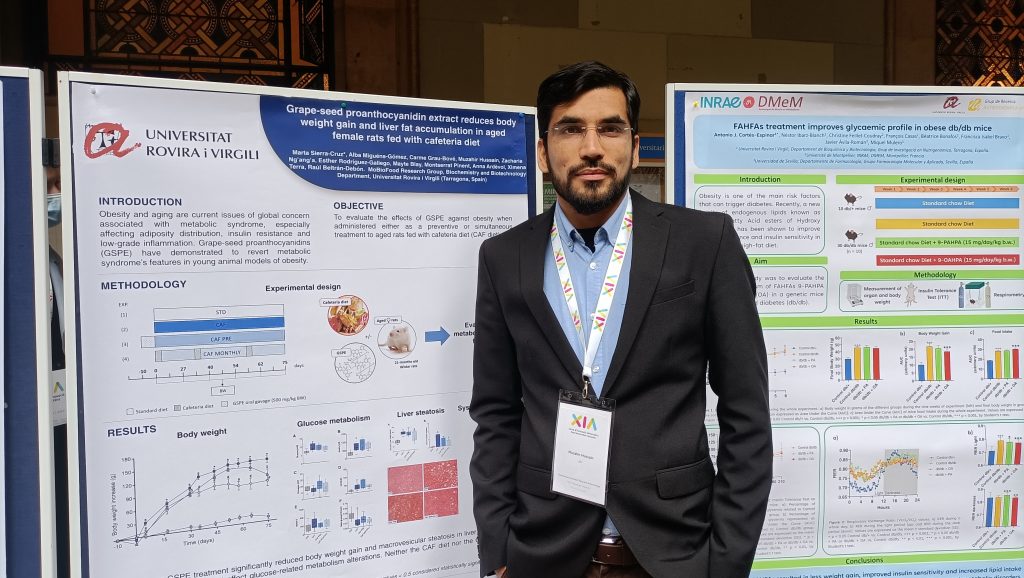28/03/2023 Interview
Muzahir Hussain, International fellow at the Faculty of Chemistry, awarded a grant by the Martí i Franquès COFUND Doctoral Programme
“In a few years, antimicrobial resistances will be the first cause of death in the world”

Muzahir Hussain, international fellow at the Faculty of Chemistry, awarded a grant by the Martí i Franquès COFUND Doctoral Programme
You are from Pakistan. How did you learn about the MFP COFUND grants, and why did you choose our university?
After the completion of my Master studies, I started searching for the most relevant and leading research groups in world that work on the relevant research projects such as intestinal health and nutritional interventions. Eventually, Dr Esther Rodríguez Gallego suggested me to apply for MFP COFUND grant, as I learned about MoBioFood research group in URV that focuses on gut health and immunity for last several years.
How would you explain your research to a non-scientific audience?
Animal production is considered one of the most important sources of antimicrobial resistances (AMR). Currently, AMR cause the death of 700,000 people/year and it is forecasted that this will exponentially increase to 10 million by 2050, becoming the first cause of death in the world. In view of this problem, the European Union already banned the use of antibiotics as AGP in 2006. Thus, the research for alternative strategies such as prebiotics, probiotics and synbiotics to the use of antibiotics in poultry is essential to fight against the emergence of AMR.
What will be the main applications of your research? Could you give us an example?
One of the most important challenges in animal nutrition is the reduction of preventive antibiotics in feed. Antibiotics, used preventively in feed, modulate the immune system reducing inflammation, increase productive performance, prevent infections and reduce mortality. However, their generalized use has a high risk of generating antimicrobial resistances. Our project addresses this challenge looking for alternatives with similar modes of action as of antibiotics without the negative impact of antibiotics.
Do you think that your research topic will be a key element in the near future? Does it tackle important societal challenges?
Our society has a strong perception about the negative consequences of AMR. In a few years, AMR will be the first cause of death in the world, and it is extremely important that the scientific community address its study. Consequently, the development of tools to reduce the appearance of AMR is essential to confront one of the most important problems of our society. It has already been mentioned the economic consequences of the spread of zoonotic pathogens, which has also an important social impact. On the other hand, the improvement of productive efficiency will have a direct effect on environmental impact of poultry production (reduction of manure, water consumption, feed use).
In the time you have been here, what have you liked the most about your experience at our university and in Tarragona?
For the last 1.5 years I am very much satisfied with the PhD programme in our university. URV gives a very versatile experience to its PhD researchers in terms of flexibility in working environment, a yearly complete package for improving one’s transversal skills, opportunities for different mobility programmes and so on. Sant Joan night on June 23 is the most liked event that is celebrated in Tarragona.
Now you are in your international secondment at the University of Copenhagen, Denmark. What do you consider is the best thing about your time staying in a foreign university? Is there something that has surprised you about their way of working?
In my international secondment at the University of Copenhagen I worked on the intestinal transcriptomics and microbiota analysis of different samples obtained after treatment of different probiotics in poultry as an alternative to antibiotics. The most surprising and the best thing I encountered here is the equal treatment of PhDs as a faculty staff member and giving an opportunity to teach and help undergraduate students in their curriculum development.
How would you say this experience contributed to your personal and professional growth?
Teaching and having practical sessions of basic course of biochemistry with undergraduate students has had a great positive impact on my personal and professional growth as a future team leader and as a supervisor in future.
What’s next for you after finishing the PhD?
After the completion of the doctoral studies in the long run, I hope to become a highly competent researcher working on key issues in the areas of antimicrobial resistance, nutrition and poultry sciences to tackle key challenges that are potential risk to public health in this modern era.
Finally, would you recommend our programme to your peers and friends?
I would like to strongly encourage and recommend potential people in my social and academic circle to think and apply to such prestigious programmes for their capacity and profile building such as the Martí i Franquès Doctoral Programme, MSCA and others.
